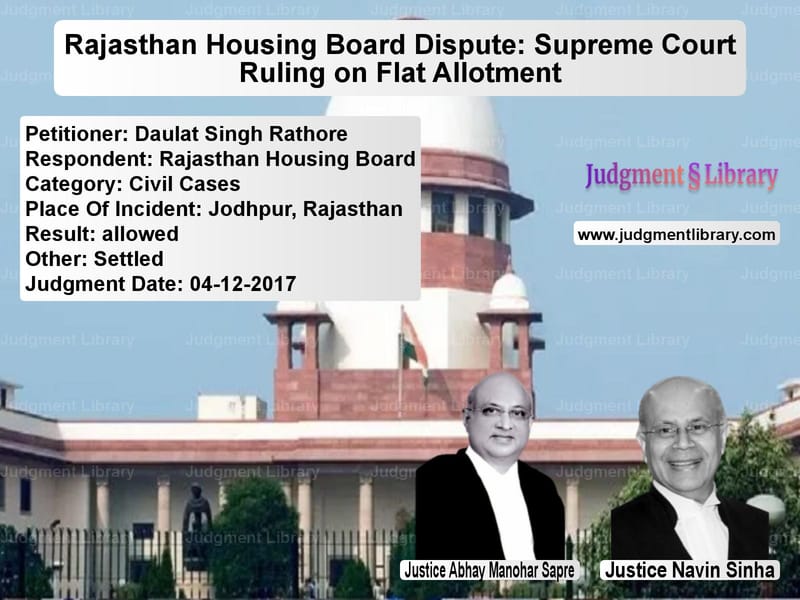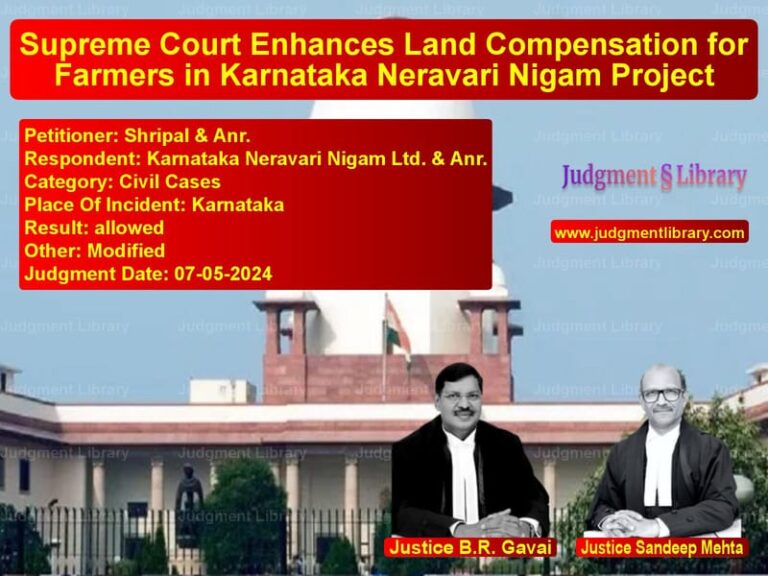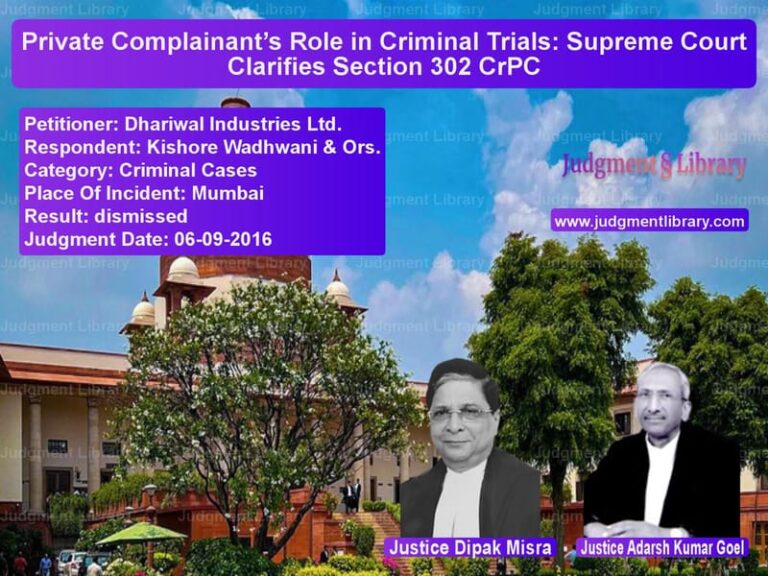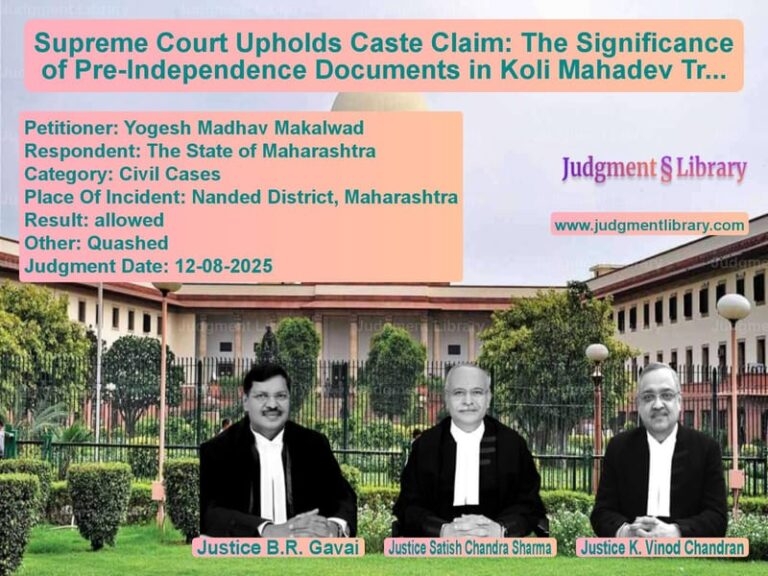Rajasthan Housing Board Dispute: Supreme Court Ruling on Flat Allotment
The case of Daulat Singh Rathore vs. Rajasthan Housing Board revolves around the long-standing dispute regarding flat allotment under the Middle Income Group ‘B’ Housing Scheme in Jodhpur. The Supreme Court was called upon to decide whether the appellant was entitled to the allotment of a flat after prolonged litigation involving the Rajasthan Housing Board (RHB).
The case highlights the issues of unfair trade practices, delayed allotment, and the procedural intricacies involved in state-run housing schemes. The Supreme Court’s ruling provided a resolution while balancing the equities between the parties.
Background of the Case
In 1982, the Rajasthan Housing Board invited applications for different categories of flats in Jodhpur. The appellant, Daulat Singh Rathore, applied for a flat under the Middle Income Group ‘B’ category and deposited the required registration amount of Rs.4,600. Subsequently, he paid the first installment of Rs.15,000 on September 18, 1993.
However, disputes arose between the appellant and the Board over the allotment, leading to prolonged litigation. The appellant initially filed a writ petition before the Rajasthan High Court, which was dismissed in 1995 as infructuous. He then pursued remedies before the Monopolies and Restrictive Trade Practices (MRTP) Commission and also filed a civil suit in 2001 challenging the actions of the Board.
Legal Issues
The key legal questions in this case were:
- Whether the Rajasthan Housing Board had engaged in unfair trade practices by not allotting a flat to the appellant.
- Whether the Board was bound to allot a flat after accepting registration fees and an installment.
- What relief, if any, the appellant was entitled to after years of litigation.
Arguments by the Petitioner (Daulat Singh Rathore)
The appellant contended:
- The Rajasthan Housing Board accepted the initial payment but failed to allot a flat despite repeated requests.
- The Board’s actions constituted an unfair trade practice under the MRTP Act.
- Despite judicial intervention, the Board did not resolve the issue fairly, forcing the appellant to approach multiple forums.
- He was entitled to a flat under the originally advertised scheme, at the price applicable when he applied.
Arguments by the Respondent (Rajasthan Housing Board)
The Board countered:
- The appellant failed to complete all necessary formalities within the stipulated time.
- Prices of flats had increased since the time of the original application, making it unfeasible to offer a flat at the old rate.
- Any delay in the allotment process was due to litigation initiated by the appellant.
- The appellant was no longer eligible under the original scheme and must pay the price prevailing at the time of final allotment.
Supreme Court’s Observations
The Supreme Court examined the legal principles involved and made the following key observations:
“The directions given hereinbelow would balance the equities between the parties and also safeguard their interest in relation to the subject matter of the appeal.”
The Court further noted:
“The Board has now agreed to allot a flat to the appellant, subject to payment at the prevailing government-approved price.”
Final Judgment
The Supreme Court ruled that:
- The Board will allot a flat to the appellant in Jodhpur under the Middle Income Group ‘B’ Housing Scheme.
- The appellant will pay the price of the flat as per the approved government rate on the date of the judgment.
- The Board will adjust Rs.19,600 (previously deposited) along with interest at 12% per annum from the date of payment until the execution of the sale deed.
- The final price of the flat will be determined after deducting this amount.
- Upon full payment, the Board will execute the sale deed in favor of the appellant. If desired, the appellant may include a first-degree blood relative as a joint owner in the sale deed.
- If the appellant fails to pay the balance amount within the stipulated period, his deposited amount shall be forfeited.
- All formalities must be completed within six months to give a final resolution to the litigation.
Implications of the Judgment
This ruling has significant implications for housing disputes in India:
- Reaffirms the principle that state housing boards must act fairly in allotment processes.
- Provides clarity on how long-pending disputes involving housing schemes should be resolved.
- Protects applicants’ rights while ensuring that housing boards are not unduly burdened by outdated price structures.
- Encourages out-of-court settlements in cases involving long-standing housing disputes.
Conclusion
The Supreme Court’s decision in Daulat Singh Rathore vs. Rajasthan Housing Board serves as an essential precedent in public housing disputes. By striking a balance between the rights of applicants and the interests of the housing board, the ruling provides a fair resolution to long-standing grievances. The judgment underscores the importance of timely action by both applicants and housing authorities to prevent prolonged litigation.
Judgment delivered by: Abhay Manohar Sapre, Navin Sinha
Don’t miss out on the full details! Download the complete judgment in PDF format below and gain valuable insights instantly!
Download Judgment: Daulat Singh Rathore vs Rajasthan Housing Bo Supreme Court of India Judgment Dated 04-12-2017.pdf
Direct Downlaod Judgment: Direct downlaod this Judgment
See all petitions in Property Disputes
See all petitions in Landlord-Tenant Disputes
See all petitions in Damages and Compensation
See all petitions in Judgment by Abhay Manohar Sapre
See all petitions in Judgment by Navin Sinha
See all petitions in allowed
See all petitions in settled
See all petitions in supreme court of India judgments December 2017
See all petitions in 2017 judgments
See all posts in Civil Cases Category
See all allowed petitions in Civil Cases Category
See all Dismissed petitions in Civil Cases Category
See all partially allowed petitions in Civil Cases Category







